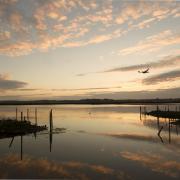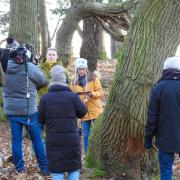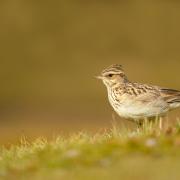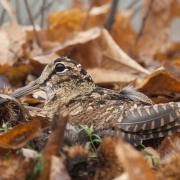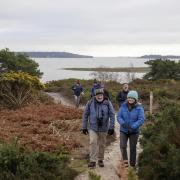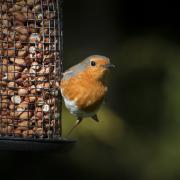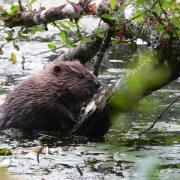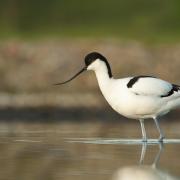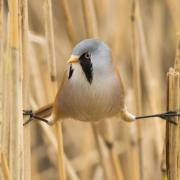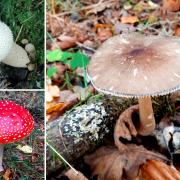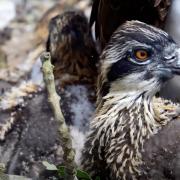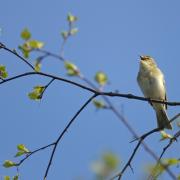From battering storms and barrel jellyfish to an award-winning island and record flocks of spoonbills, Dorset Wildlife Trust’s Sally Welbourn reflects on 2014 - a year to remember
This has been a great year for wildlife in Dorset. Donations of time and enthusiasm from Dorset Wildlife Trust (DWT) supporters, volunteers and members have allowed us to carry out important conservation work such as putting up barn owl nesting boxes, cleaning beaches after the winter storms, carrying out river restoration work and leading the biggest conservation project in Dorset, The Great Heath Living Landscape.
--------------------------------------------------
In January and February Dorset’s coast was battered by the worst storms seen in years. Dead and distressed seabirds such as guillemots and razorbills were washed up along the coast. Chesil Beach was hit particularly hard, huge waves washed up piles of litter. Hundreds of volunteers litter picked, giving wildlife and the beaches a head-start to recovery.
--------------------------------------------------
The Great Heath is Launced
In April, £2.7million from the Heritage Lottery Fund, and £2 million from local fundraising allowed DWT and partners to purchase over 1500 acres of land as part of the Great Heath Living Landscape project. Many of the new sites such as Lytchett Bay, Upton Heath, Holes Bay, Parley Common and Ferndown Common provide habitats for rare and threatened wildlife. This exciting project is a huge investment in Dorset’s heritage, and is set to benefit not only wildlife, but people too.
--------------------------------------------------
Crayfish Plague on the River Allen
In July, following an investigation by DWT and the Environment Agency, the ‘crayfish plague’ was confirmed on Dorset’s River Allen. The disease which is fatal to our native white clawed crayfish is carried by American signal crayfish which escaped into the wild some years ago. Dorset has populations of the UK’s only native crayfish on just three rivers, including the River Allen. DWT has launched an urgent appeal to help raise money for river restoration work to protect and create habitat for white-clawed crayfish and try to prevent their disappearance from Dorset altogether.
dorsetwildlifetrust.org.uk/crayfishappeal
--------------------------------------------------
The Real Value of Dorset Revealed
The State of Dorset’s Environment, a report by Dorset’s Local Nature Partnership (LNP), was launched in September. The report, which looked at the bigger picture of how Dorset’s environment is doing, revealed that the county has a natural heritage worth billions of pounds each year in income, but it is very fragile and had been badly damaged in the past, with 76 sites for nature conservation being lost or damaged since 2005. On the positive side the findings revealed that otters had returned to almost all of Dorset’s rivers.
Read the full report here: dorsetwildlifetrust.org.uk/naturalvaluereport
--------------------------------------------------
Record-breaking Spoonbills
In October a sighting of the largest flock of spoonbill ever seen in the UK was recorded on Brownsea Island lagoon. Over the last decade the number of spoonbill has been gradually increasing in Poole Harbour, resulting in a flock of 47 appearing and breaking records this autumn. For around 50 years there had only ever been two or three spoonbills during the winter. One of the reasons for this increase is thought to be youngsters following their parents back to their wintering quarters.
--------------------------------------------------
Jellyfish Sightings
May and June saw an unusual number of barrel jellyfish being washed up on beaches at Portland, Weymouth, Poole and Lyme Regis, to name just a few. The appearance of so many jellyfish was attributed to the storms earlier in the year stirring up nutrients from deeper water allowing blooms of microscopic algae to grow and create perfect conditions for jellyfish to feed close to the shoreline.
--------------------------------------------------
Brownsea is Britain’s Favourite
For over 50 years, the National Trust and Dorset Wildlife Trust have been working in partnership to manage Brownsea Island for the benefit of wildlife and enjoyment of people. In February BBC Countryfile Magazine named Brownsea Island ‘Britain’s favourite nature reserve’. The island was described as: ‘a wildlife haven made even more delightful for being an island.’
dorsetwildlifetrust.org.uk/brownsea_island_reserve
***
Read on
• *VIDEO* Honey Buzzard spotted in Portland




